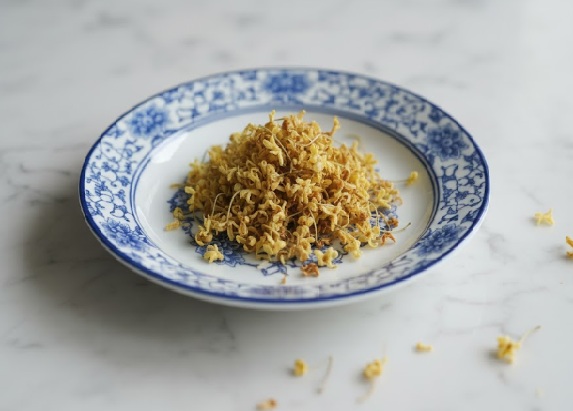Sweet Osmanthus Flower

Sweet Osmanthus Flower (Gui Hua): A Fragrant Herb for Lung Health, Skin Beauty, and Emotional Balance
Introduction
Sweet Osmanthus Flower, known as Gui Hua (桂花) in Traditional Chinese Medicine (TCM), comes from the blossoms of the Osmanthus fragrans tree, treasured for its delicate aroma and uplifting qualities. Beyond its culinary use in teas and desserts, Gui Hua is valued as an herb that gently disperses phlegm, warms the lungs, promotes clear skin, and soothes the emotions. It is warm, sweet, and slightly pungent in nature, entering the Lung and Stomach meridians.
What Is Sweet Osmanthus Flower?
Gui Hua consists of small golden-yellow flowers traditionally used in both medicine and cuisine. In TCM, it is believed to transform dampness, dissolve phlegm, and promote Qi circulation in the chest and upper body. It is also used for its beautifying and mood-lifting properties, making it a favorite ingredient in fragrant herbal teas and skin-nourishing tonics.
Health Benefits of Sweet Osmanthus Flower
Clears Phlegm and Eases Cough
Gui Hua helps relieve cough, chest congestion, and phlegm buildup caused by cold or damp conditions by gently warming and transforming mucus.
Promotes Skin Radiance and Detoxification
By aiding circulation and supporting the body’s natural detox pathways, Sweet Osmanthus helps purify the skin, reduce blemishes, and enhance natural glow.
Supports Digestive Health
Its warming and aromatic nature helps dispel cold in the stomach, relieve bloating, and stimulate appetite.
Uplifts Mood and Calms the Mind
The soothing floral scent of Osmanthus is known to ease stress, anxiety, and emotional fatigue, promoting a sense of peace and relaxation.
Freshens Breath and Beautifies the Body
In TCM beauty traditions, Gui Hua tea is consumed to remove internal heat and toxins that cause bad breath, skin dullness, or dryness.
How to Use Sweet Osmanthus Flower
In Herbal Teas
Steep 2–3 grams of dried Osmanthus flowers in hot water for 5–10 minutes. Combine with green tea, goji berries, or chrysanthemum for enhanced benefits and aroma.
In Tonic Soups or Desserts
Add Osmanthus to sweet soups, steamed pear desserts, or rice congee to nourish the lungs and brighten the complexion. It pairs well with honey, longan, or red dates.
In Aromatherapy or Baths
Use dried flowers in bath sachets or essential oil blends to relax the body, soothe skin, and improve mood through natural fragrance therapy.
Where to Buy Sweet Osmanthus Flower
You can find Gui Hua at:
- Chinese herbal shops or apothecaries
- Online retailers such as iHerb, Amazon, or ChineseHerbsDirect
- Asian supermarkets specializing in dried flowers and herbal teas
Look for:
- Bright golden-yellow blossoms with a strong, sweet floral aroma
- Dried, pesticide-free flowers for best purity
- Whole blossoms rather than powdered form for teas and soups
Are There Any Side Effects?
Sweet Osmanthus Flower is very mild and generally safe. However, avoid excessive use if you have Yin deficiency with internal heat or chronic dryness. Pregnant women should use it moderately, especially in concentrated essential oil form.
Conclusion
Sweet Osmanthus Flower (Gui Hua) is a gentle yet powerful aromatic herb that supports lung health, beautifies the skin, and uplifts the spirit. Whether enjoyed as a fragrant tea, nourishing dessert, or soothing bath infusion, Gui Hua embodies harmony between health and elegance — a timeless TCM treasure for inner and outer well-being.
FAQs
Can I drink Osmanthus tea every day?
Yes. Drinking a light Osmanthus tea daily is safe and beneficial for detoxification, lung support, and relaxation.
Does Osmanthus help with skin and beauty?
Absolutely. Its natural antioxidants and circulation-promoting qualities help brighten the skin and reduce dullness.
Can I mix Osmanthus with other herbs?
Yes. It pairs beautifully with herbs like chrysanthemum, goji berries, and green tea for added detoxifying and beautifying effects.

